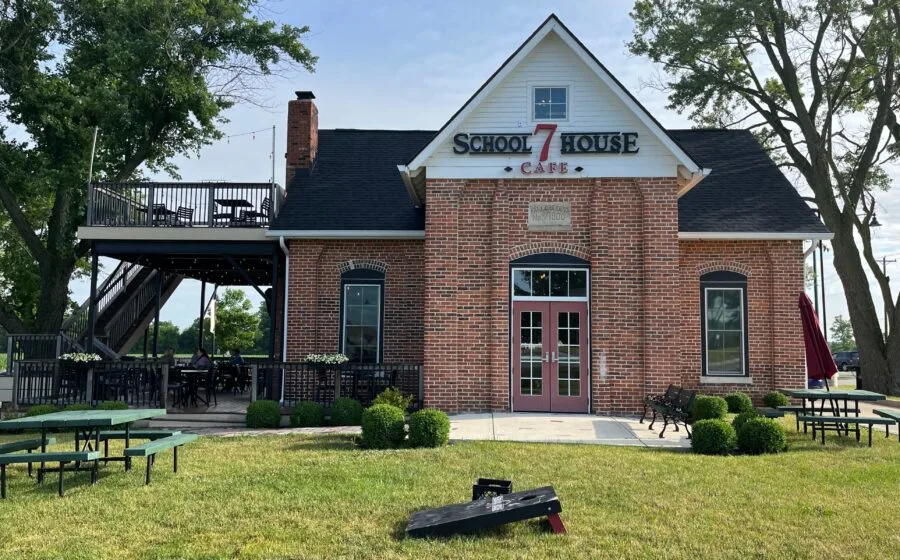How A 1900’s Schoolhouse Became A Community-Focused Coffee Shop

Tucked away in the bustling city of Fishers, Indiana, just outside of Indianapolis, stands a monumental schoolhouse. Children’s drawings and posters of school events cover the glass of the front door. The sounds of study groups mix with the whistle of espresso machines. Sturdy brick walls and a wooden patio lead to two bright red doors. The doors once signaled the start of a school day. Now, they welcome customers to a unique home of coffee.
Upon entering the cafe, patrons can instantly glean the intellectual history of the building. Photos of the first class of Schoolhouse 7 hang on the brick walls; drink sizes are referred to not as small, medium, and large but as freshman, senior, and graduate; cork boards display souvenirs, handwritten notes, and scribbled artwork created by elementary students from both the past and present. On the patio, overlooking the city’s lively streets and neighborhoods, stands the field where children once played during recess.
Schoolhouse 7 Cafe is famous among locals because of its former life as a one-room schoolhouse. Initially built to educate students from first through eighth grade, Schoolhouse 7 began construction in 1898 and hosted its first class in 1900. The school shut down in 1945, and after decades of vacancy and residency, it reappeared as a coffee shop.
But Schoolhouse 7 Cafe will never forget its roots. Though the customers now lean over laptops instead of textbooks, and the patrons dine on pastries instead of leftovers packed in lunchboxes, the cafe is a significant monument to Fischers’ past. And that’s exactly how the locals like it—filled with relics of the past, delights of the present, and social promises for the future.
Discovering the School
Schoolhouse 7 Cafe would not exist if not for a mysterious letter written by a former student. In 2017, Curt Tappendorf, a civil engineer by trade, discovered a vacant residence available for sale. Wishing to create a rental space for investment, he bought the building and made plans for restoration.
These plans were quickly interrupted when Tappendorf discovered the building’s forgotten past. “When I bought it, I had no idea about the history of this place,” says Tappendorf. Shortly after his purchase, he received a binder from the principal of a nearby school filled with artifacts: township maps, report cards, class photos, and more, not only revealing the building’s past as a schoolhouse but unveiling the significance the school had to the city over a century ago.
Among the artifacts, Tappendorf discovered a letter from a former student named George Underwood. The letter, written long after Underwood’s graduation, expressed deep gratitude and affection for Schoolhouse 7. Underwood left his phone number on the letter, so Tappendorf picked up the phone and called Underwood to learn more about the school’s history.
Underwood was 90 years old at the time Tappendorf called him, a retired doctor who opened a practice in Lafayette, just an hour outside of Fishers, after medical school, and was more than eager to chat with Tappendorf about the school he dearly loved. “His mind, his memory, was unbelievable,” said Tappendorf. “He drove himself down [to the building], met with me, and walked the entire premises. He showed me all the different things they did when he was growing up.”
The two bonded over stories from Underwood’s youth. Underwood told him about the games of baseball he would play, the classes (and scoldings) he would hear, the small bus he would ride, and more. Mesmerized by these tales, Tappendorf scrapped his idea of creating a rental space for other companies and instead decided to use the former schoolhouse as a community space based on his love for coffee. “People coming and gathering and talking and playing games and hanging out, that’s what I really wanted to get to,” he says.
Restoring History
In January 2019, Tappendorf officially began restoring the schoolhouse. He prioritized preserving the school’s history as much as possible: He tuckpointed and electrically brushed the walls to preserve the original bricks, pushed the ceiling higher (also original), and used the floor’s old panels to create the furniture and counter space in the cafe.
Underwood was also heavily involved in the reconstruction. His endless memories of the school inspired much of the layout. “Whenever (Underwood) would come here,” says Tappendorf, “he would say, ‘I want to see more chalkboards.’ So we have our menus here to represent chalkboards. We wanted to make sure we kept the same chalkboard look.”
Underwood’s impact shines through the cafe through various monuments. Next to the cafe’s larger tables, a commemorative locker specifically dedicated to holding his doctor’s scrubs can be found hanging on the wall. Various photos of Underwood’s class and schoolmates, souvenir postcards he received from his teacher, and old report cards are arranged throughout the cafe. The most notable monument to Underwood’s memory is a private space named “George’s Study,” a room in the attic often rented out for private events and children’s gatherings.
School Is In Session
Schoolhouse 7 Cafe opened to the public in August 2019. With its rich history, warm interior, and significance to the community, the cafe instantly turned into one of the most beloved spots in Fishers. “People would stop by and say, ‘We love what you’re doing,” says Tappendorf. “Seeing that, and seeing [people] ‘cheering from the stands,’ per se, helped keep this dream alive.”
The building’s unmatched history brings customers of all kinds to the coffee shop daily. “I think a lot of new and regular customers come here because of the environment and the history,” says Stephanie Jones, a manager and barista at Schoolhouse 7 Cafe. “It’s unique. You can’t make another one.”
Today, Schoolhouse 7 Cafe is a cozy yet bustling bistro. The sound of coffee brewing and oven timers going off blends into the sounds of endless conversations from the patrons. The cafe has board games and books for patrons to peruse, and cozy lounge areas are always occupied by visiting customers. Merchandise for the shop, such as t-shirts and custom mugs, are popular and fly off the shelves. And, vital to Tappendorf’s vision is the vast array of live events. Trivia games, storytime for preschoolers, and even private celebrations (including weddings!) occur regularly. “It’s a true community-type place where you name it, it can happen,” said Tappendorf.
Another value Schoolhouse 7 Cafe holds dearly is education. Tappendorf and his team display artwork from local students, encourage kids to use the shop to study, and hang thank you notes from students who love the space like Underwood did decades ago. The most vital thing Schoolhouse 7 offers students is a safe place to go. “If (the students) ever need a place to go, to walk over, this could be a safe zone,” said Tappendorf.
Underwood passed away shortly after the coffee shop opened at the age of 94. Despite his death, his influence on the community will always be cherished by the citizens of Fishers. Multiple copies of his letter—the letter that inspired it all—can be found throughout the cafe, readily available for customers wishing to learn more about the cafe’s history. The final sentence of his letter, which he wrote as a welcome to new schools in the area, holds his wish for future generations: “If you set your sights high, and pursue your dreams, you can achieve your goals and have great success.”
Like this project
Posted Jul 7, 2023
Schoolhouse 7 Cafe takes a lesson from its former life as a one-room schoolhouse with decades of history.
Likes
1
Views
36
Clients

Fresh Cup Magazine








